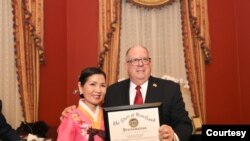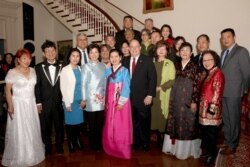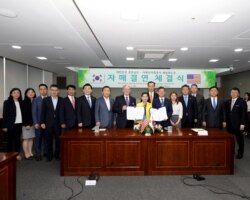Yumi Hogan, who as Maryland’s first lady helped the state secure a half-million coronavirus tests from her native South Korea, is working behind the scenes to secure donations from the Asian American communities in Maryland to fight against the virus.
Asian Americans in Maryland donated to the state government about 560,000 pieces of personal protective equipment, including masks, hand sanitizers, face shields and medical gowns. Their donations were part of the “Maryland Unites” initiative launched in March by Governor Larry Hogan, to receive donations and volunteers from the private sector.
In an interview with VOA’s Korean service Thursday, Yumi Hogan said, “I think [the donations] were the result of the special relationship I maintained with the Asian communities. Through the donations, the Asian communities proved they can play an important role.”
Capitalizing on networks
Among the donors is Chiling Tong, the president of the Asian & Pacific Islander American Chamber of Commerce and Entrepreneurship. Tong worked with Eugenia Henry, the Baltimore Chapter president of the Global Federation of Chinese Business Women Association, to mobilize community members and donate 40,000 surgical masks and 10,000 face shields to Maryland.
Tong told VOA in an interview that the donations were aimed at showing appreciation to Maryland’s nurses and doctors working on the front lines. She also said her ties with Yumi Hogan played an essential part in making the donation decision.
“We are absolutely inspired by first lady Yumi Hogan. She cares about people all the time; her leadership has been fully focused on saving lives during this pandemic. She also informed us about what PPE the state of Maryland needs, how the state can accept and distribute them, which was very helpful for donors,” Tong said.
South Korean heritage
On April 18, a chartered 777 Korean Air flight landed at Baltimore-Washington International Thurgood Marshall Airport to deliver 500,000 coronavirus tests, marking the first time a Korean passenger plane landed at the airport.
Two days later, in a press conference outside Maryland Government House, Governor Larry Hogan said, he purchased the test kits from South Korea because he couldn't secure them from the Trump administration. Governor Hogan said "We have been doing everything in our power to acquire more tests from the federal government. Unfortunately, we have also had to compete with every state in America in our attempts to procure tests from every domestic producer in the U.S. and from sources around the globe."
Hogan also called his wife "a champion" saying the deal would not have come together if it weren't for her, who made a personal plea to South Korean Ambassador to the U.S. Lee Soo Hyuk in her native language. President Trump criticized Governor Hogan's purchase of test kits from South Korea, saying he "could've saved a lot of money" if he called Vice President Mike Pence instead.
But Yumi Hogan still remembers the day the test kits arrived with great excitement and emotions.
“When we brought coronavirus test kits from South Korea, I was deeply moved, because we brought the kits straight from South Korea [to BWI]. Just like my dream, a direct flight is possible. I was so happy,” Yumi Hogan recalled.
Maryland’s first lady also led a business delegation to South Korea in 2017, and during the trip signed a sister-state agreement between Maryland and South Jeolla province.
She also brought a Korean plant called “Jjok,” also known as Asian Indigo, to Baltimore to introduce Korea’s natural dye culture.
Yumi Hogan is an artist, an abstract painter drawing nature using Sumi ink on Hanji paper, made from Korean trees.
Art is what connected her with Larry Hogan, 20 years ago, when they first met at an art show. They married in 2004.
“He is proud to be called ‘the son-in-law of the Korean people,’ ” Yumi Hogan said of her husband. She said he “loves Korean culture and loves spicy Korean food” and tells her to use more gochugaru, or chili flakes.
As Maryland’s first lady
Yumi Hogan emphasized that she is not a politician but a mother, and that’s how she defines her role as the first lady of Maryland.
“Even with a great legal system and administrative system, there are still many people who need attention and care. Children, women, people with disabilities, and financial difficulties, especially single mothers. I want to comfort them and spend time with them. I want to embrace them with the heart of a mother,” she said.
Yumi Hogan said she is particularly affected by children without parents, as she, the youngest of eight children, was raised in a big family. She also pays special attention to pediatric patients, providing them art therapy through her nonprofit YUMI C.A.R.E.S.
Yumi Hogan was raised on a chicken farm in Korea and moved to America in the late 1970s with her first husband. She had three daughters before divorcing and moving to Maryland. In 2015, she became the first Asian American first lady in Maryland and the first Korean American first lady in any state.






